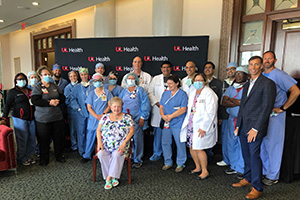 UofL Health – Jewish Hospital is celebrating its 1,000th transcatheter aortic valve replacement (TAVR) procedure. Dr. Brian Ganzel, UofL Physicians – Cardiovascular and Thoracic Surgery recently performed the milestone minimally invasive heart procedure on Patricia Hendricks of Springfield, Ky.
UofL Health – Jewish Hospital is celebrating its 1,000th transcatheter aortic valve replacement (TAVR) procedure. Dr. Brian Ganzel, UofL Physicians – Cardiovascular and Thoracic Surgery recently performed the milestone minimally invasive heart procedure on Patricia Hendricks of Springfield, Ky.
“This is truly a team effort because there are so many people involved,” said Dr. Ganzel. “Cardiologists, surgeons, anesthesiologists, nurses, technicians all come together to pull this off and provide good care for the patients. This also takes dedication from the hospital administration because this is not a cheap endeavor.”
“I feel very lucky that I had Dr. Ganzel as my doctor and I love his staff. I have another whole life to look forward to. I really feel that way now,” Patricia said. “If you have heart problems this is where you need to be.”
Jewish Hospital was the first in Kentucky to perform a transcatheter aortic valve replacement in 2011. A TAVR procedure is used to treat patients suffering from aortic stenosis, which occurs when a narrowed aortic valve blocks the flow of blood from the heart to the brain and body. TAVR is a minimally invasive procedure where doctors insert a catheter in a patient’s leg or chest to replace the valve. A majority of TAVR patients go home a day after the procedure.
“Jewish Hospital is a national leader in advanced heart care,” said John Walsh, chief administrative officer of Jewish Hospital. “As an academic health care system, we are committed to advancing minimally invasive heart procedures so patients can quickly return to their loved ones and resume their normal activities.”
The Rudd Heart and Lung Center at Jewish Hospital is not only leading the way in performing cutting-edge treatments but also trains physicians from around the world on advanced techniques.
“Our team’s expertise is helping save lives well beyond Kentucky and Southern Indiana,” said Debra Riley, vice president of cardiovascular services. “It’s an honor to work alongside people who truly make a difference.”
Aortic stenosis can be life-threatening if patients do not have an aortic valve replacement. Symptoms of aortic stenosis can include chest pain, fluttering heartbeat, trouble breathing, fatigue, decline in routine physical activities and difficulty sleeping. However, someone suffering from aortic stenosis may not experience symptoms right away.
To learn more about the heart valve program at UofL Health click here.
Patricia, the 1,000th TAVR recipient at Jewish Hospital, shared her story on the ongoing American Heart Association’s Red Couch Tour, locally sponsored by UofL Health. Visit UofLHealth.org/RedCouchTour to watch.



